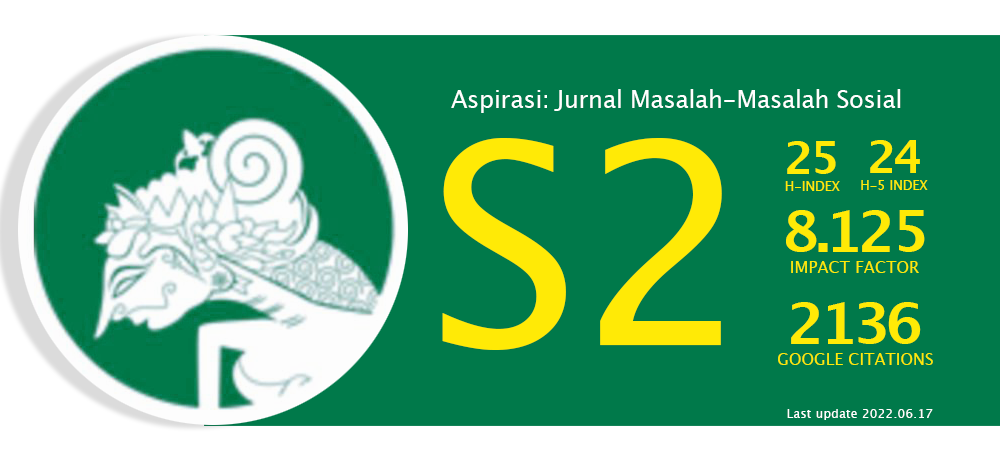The Challenges of Unique Poverty Alleviation Policies in Banten and Yogyakarta
Abstract
Poverty remains a persistent challenge nationally and subnationally. Reliance on ineffective grants fuels poverty. This study analyzes innovative poverty alleviation policies in Banten and Yogyakarta, focusing on inter-branch interactions. Collaboration is key to creating better joint policies and maintaining parliamentary oversight of the government’s programs. The purpose of this study is to outline the challenges and factors that influence the success of innovative policies in both regions. This study uses a qualitative approach and a comparative case study design. Data were collected through in-depth interviews, in-depth fieldwork, focus group discussions (FGDs), and document analysis conducted between 2015 and 2017, and analyzed using a deductive thematic approach. The results of this study show that poverty alleviation approaches should be tailored based on thematic analysis of each region. This study suggests a best practice approach to evaluate policy effectiveness. Therefore, this study recommends that the DPR RI collaborate with the government for optimal policy implementation. In addition, the DPR RI needs to promote poverty-related legislation, conduct cross-sectoral and cross-actor oversight, and/or reform the poverty budget mechanism.
Keywords
Full Text:
PDFReferences
Agusta, I. (2014). Diskursus, kekuasaan, dan praktik kemiskinan di pedesaan. Obor.
Arsani, A. M., Ario, B., & Ramadhan, A. F. (2020). Impact of education on poverty and health: Evidence from Indonesia. Economics Development Analysis Journal, 9 (1), 87–96.
Ayoo, C. (2022). Poverty reduction strategies in developing countries. In C. Ayoo. Rural Development-Education, Sustainability, Multifunctionality (pp. 17–57). Intechopen. http://dx.doi.org/10.5772/intechopen.101472
Birkland, T. A. (2017). Agenda setting in public policy. In Handbook of public policy analysis (pp. 89–104). Routledge.
Bradshaw, T. K. (2007). Theories of poverty and anti-poverty programs in community development. Community Development, 38(1), 7–25.
Chambers, R. (2010). Paradigms, poverty and adaptive pluralism. IDS Working Papers, 2010(344), 01–57.
Chaudhuri, E., Kurniawati, S., & Sumarto, S. (2019). Decentralisation and poverty reduction: The role of local economies and institutional capacity in Indonesia. TNP2K.
Chohan, U. W. (2023). Public value and bureaucratic rhetoric. In Global encyclopedia of public administration, public policy, and governance (pp. 11079–11083). Springer.
Endrawati, D. (2022). Determinants of working poverty in Indonesia. Journal of Economics and Development, 24(3), 230–246.
Huang, Y., Li, X., & Yu, M. (2024). Assessment of local officials and government‐initiated CSR: Evidence from targeted poverty alleviation in China. Economics & Politics, 36(1), 557–579.
Institute for Research and Empowerment [IRE]. (2013). Emansipasi desa dalam penanggulangan kemiskinan [Policy paper]. IRE and Australian Community Development and Civil Society Strengthening Scheme (ACCESS) Phase II-AusAID.
Jati, W. R. (2016). Mobilitas warga desa kelas menengah: Studi kasus di Pandeglang dan Gunungkidul. Analisis CSIS, 45(3), 265–280.
Jati, W. R. “Narimo ing pandum”: How highlander women perceive poverty as a destiny in Gunungkidul, Yogyakarta. Masyarakat: Jurnal Sosiologi, 28(1), 1–20.
Jati, W. R., Hadi, A., & Thung, J. L. (2018). Indeks kerentanan & profil rumah tangga miskin. LIPI Press.
Laurens, S., & Putra, A. H. P. K. (2020). Poverty alleviation efforts through MDG’s and economic resources in Indonesia. The Journal of Asian Finance, Economics and Business (JAFEB), 7(9), 755–767.
Lepianka, D., Van Oorschot, W., & Gelissen, J. (2009). Popular explanations of poverty: A critical discussion of empirical research. Journal of Social Policy, 38(3), 421–438.
Nugroho, A., Amir, H., Maududy, I., & Marlina, I. (2021). Poverty eradication programs in Indonesia: Progress, challenges and reforms. Journal of Policy Modeling, 43(6), 1204–1224.
Nugroho, R. D. (2006). Kebijakan publik untuk negara-negara berkembang. PT Elex Media Komputindo (Gramedia).
Pribadi, Y. (2013). Religious networks in Madura: Pesantren, Nahdlatul Ulama and kiai as the core of santri culture. Al-Jami’ah, 51(1), 1–32.
Purwono, R., Wardana, W. W., Haryanto, T., & Mubin, M. K. (2021). Poverty dynamics in Indonesia: Empirical evidence from three main approaches. World Development Perspectives, 23, 100346.
Saragi, N. B., Muluk, M. K., & Sentanu, I. G. E. P. S. (2021). Indonesia’s village fund program: Does it contribute to poverty reduction? Jurnal Bina Praja: Journal of Home Affairs Governance, 13(1), 65–80.
Solikatun, S., Masruroh, Y., & Zuber, A. (2014). Kemiskinan dalam pembangunan. Jurnal Analisa Sosiologi, 3(1), 70–90.
Sugiharti, L., Purwono, R., Padilla, M. A. E., & Jayanti, A. D. (2022). Poverty dynamics in Indonesia: The prevalence and causes of chronic poverty. Journal of Population and Social Studies, 30, 423–447.
van Bruinessen, M. (2021). Traditionalist muslims and populism in Indonesia and Turkey. Tashwirul Afkar, 40(2), 1–27.
van der Meulen Rodgers, Y., Bebbington, A., Boone, C., Dell’Angelo, J., Platteau, J.-P., & Agrawal, A. (2020). Experimental approaches in development and poverty alleviation. World Development, 127, 104807.
Wulandari, R. D., Laksono, A. D., Prasetyo, Y. B., & Nandini, N. (2022). Socioeconomic disparities in hospital utilization among female workers in Indonesia: A cross-sectional study. Journal of Primary Care & Community Health, 13, 21501319211072679.
Yumna, D. R. U., Ayu, R. S., Dewi, A., Putri, N. F., & Ridwan, R. (2024). Analisis kebijakan program keluarga harapan dalam memutus kemiskinan di Indonesia. Triwikrama: Jurnal Ilmu Sosial, 5(7), 61–70.
Zuo, C. (2022). Integrating devolution with centralization: A comparison of poverty alleviation programs in India, Mexico, and China. Journal of Chinese Political Science, 27(2), 247–270.
DOI: https://doi.org/10.46807/aspirasi.v16i1.4450
Refbacks
- There are currently no refbacks.








